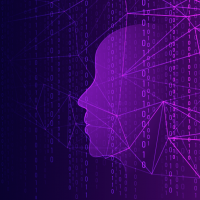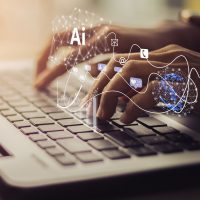
The use of Artificial Intelligence in medicine has increased over the last decade. With the potential to make sense of large amounts of raw data, such as natural language text and images, AI is used for a whole range of medical and research purposes. AI technology can improve diagnosing, treating, and predicting outcomes and help deliver more efficient and precise healthcare.
From advancing new drug discovery and preventative medicine to taking care of wellness and diagnostics, AI in medicine may be used in various ways.
- Automated image analysis
AI technology expands the ability to analyze images by using pattern recognition. AI-assisted models can identify complex patterns in imaging data with improved accuracy and precision, discovering early predictions of diseases.
- Medical data management
Integrating Artificial Intelligence for collecting, storing, and tracing information simplifies and enhances data management to a great extent. With the ability to make sense of mass datasets, AI aids administrative organization.
- Workflow and administrative tasks
Carrying out scans, X-rays, analyzing tests, performing data entry, and other repetitive tasks can be done faster and more accurately by robots. AI can be effectively used to support administrative tasks and help doctors and nurses save significant time.
- Drug creation
The process of developing pharmaceuticals through clinical trials is a time-consuming and expensive process. AI-enabled programs can make drug discovery more efficient by scanning the existing drugs, sorting, and determining the target molecules that could be used as viable candidates to move forward through the process.
- Virtual nurses
AI nursing assistants can help monitor the conditions of patients, provide quick answers regarding medical conditions, keep regular communication between care providers and patients to reduce unnecessary hospital visits and the load on medical professionals.
AI applications in the medical industry continue to grow with widespread adoption by healthcare provider organizations, life science companies, and healthcare technology vendors that are expected to spend an average of 54 million on AI projects this year. As various reports state, the market for AI in healthcare is expected to reach $6.6 billion by 2021, while investments in AI are predicted to grow to $36.8 billion by 2025.
The role of Artificial Intelligence in healthcare has become even more important in battling the global health emergency caused by the coronavirus. AI has been used as a vital tool to support the fight against the outbreak by helping to discover new treatments and vaccines faster, assisting healthcare personnel at hospitals to reduce the exposure to patients, predict the rate of spread of the infection and its mutations, monitor people’s temperature and identify individuals who have shown symptoms of the disease.
Checking symptoms and assessing the risk of exposure to the disease has become possible through Covid-19 checkers. We’ve also launched our AI-based SmartChecker that examines X-ray images of the chest of a patient and gives a probability of several diagnoses. The automated analysis system aims to speed up the diagnosis made by doctors and support healthcare providers with tracing possible diseases more quickly and efficiently.

Rem Darbinyan is the Founder and CEO at SmartClick. He is a serial entrepreneur, angel investor, seasoned advisor, author, and keynote speaker with an investment portfolio of 40+ startups.


